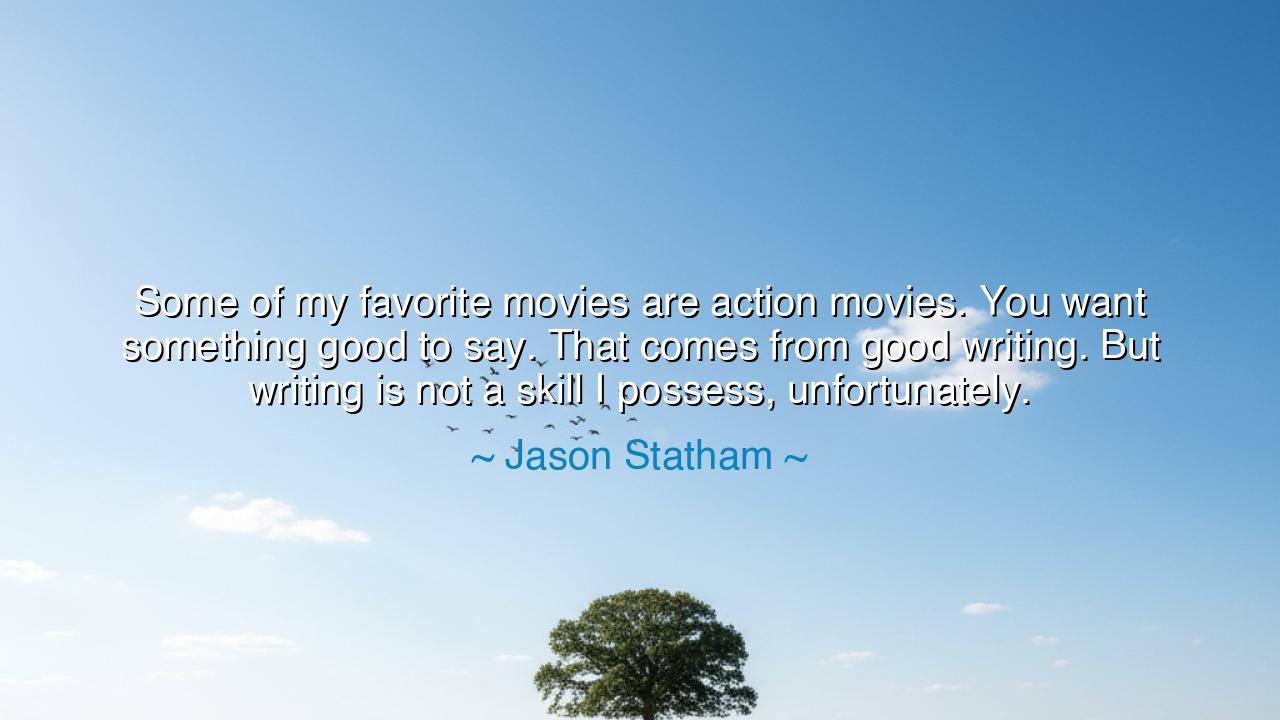
Some of my favorite movies are action movies. You want something
Some of my favorite movies are action movies. You want something good to say. That comes from good writing. But writing is not a skill I possess, unfortunately.






In the mighty march of human history, it is often not the strength of the body alone that defines greatness, but the power of words—words that inspire, words that move, and words that shape the very future. Jason Statham, in reflecting on the nature of action movies, speaks to the foundation of all great storytelling when he says, "Some of my favorite movies are action movies. You want something good to say. That comes from good writing. But writing is not a skill I possess, unfortunately." In this humble admission, Statham speaks not only to the art of cinema, but to a deeper truth about the nature of skill and self-awareness. To acknowledge the limitations of one’s abilities is not a weakness, but a strength, for it is through understanding what we lack that we can truly recognize what we must cultivate.
In the ancient world, the most powerful figures were not just those of great strength but those whose words carried weight. Homer, through his epic poems like the Iliad and Odyssey, shaped the minds of generations with the force of his writing. Though he did not lead armies or wield a sword, his words transcended time, shaping the moral compass of ancient civilizations. It is said that Homer's writings were not just stories but lessons on the human spirit, on bravery, honor, and the consequences of action. In the same way, Statham’s acknowledgment of good writing as the bedrock of meaningful cinema speaks to the ancient belief that, though the body may be strong, it is the mind—the word—that truly drives the story forward.
Consider the ancient philosophers—figures like Aristotle, whose writings laid the foundations for logic, ethics, and dramatic theory. Aristotle’s Poetics, which discussed the principles of tragedy, showed that a story is not just about action but the ideas it carries. Great drama, Aristotle taught, comes from characters who are compelled to make choices that reflect their virtues or flaws. Action, while exciting, is hollow without the words that underpin it, without the moral weight that defines its true impact. Statham’s preference for action movies, which are often driven by spectacle and intensity, is tempered by his recognition that it is the writing—the thought behind the action—that elevates the story and gives it meaning. This is a truth as old as the ancients—without substance, even the most thrilling action is but a fleeting moment, soon forgotten.
The admission of Statham—that writing is a skill he does not possess—is a lesson in humility. The ancient Greeks revered humility as a virtue, recognizing that only by understanding the limits of one’s abilities could one achieve true greatness. Socrates, the philosopher who founded much of Western thought, was known for his humble approach to knowledge. He famously declared that his wisdom lay in the knowledge that he knew nothing. This acknowledgment was not a declaration of inadequacy but of profound insight. To know one’s own limitations is the first step toward mastery, for it is only when we embrace our shortcomings that we can begin to improve. Statham’s self-awareness about his abilities, and his ability to recognize the true value of writing, speaks to the wisdom of the ancients in understanding that no one is gifted in every aspect of life. Greatness is not about possessing every skill but about cultivating the right ones and recognizing the importance of those skills in the larger story of life.
This theme of self-awareness and growth speaks to the broader human experience. We are all called, at different points in our lives, to recognize what we excel at and what we must learn. Leonardo da Vinci, for instance, though a master painter, was also a great thinker and inventor. Yet, he, too, struggled with the limitations of his own knowledge. His relentless pursuit of learning in engineering, anatomy, and mechanics shows us that to become truly great, we must accept our limitations and push to overcome them. Statham, much like da Vinci, understands the importance of growth—in his case, a growth that involves learning the intricacies of writing and storytelling.
The lesson here is profound: true greatness is not achieved by those who are perfect in every way, but by those who understand their own limitations and seek to grow from them. Just as Socrates embraced his ignorance as a path to wisdom, and Leonardo tirelessly sought new knowledge in his later years, we too must look at our lives and recognize where we must improve. It is not enough to be content with what we know; we must be willing to learn, to cultivate new skills, and to recognize the value in those skills that seem beyond our grasp.
So, as you journey through life, remember Statham’s wisdom—acknowledge what you lack, but do not be deterred. Instead, see it as an opportunity for growth. Seek out those who can help you develop the skills that you wish to cultivate, whether they be in writing, art, or any other craft. The great heroes of the past did not achieve greatness because they had everything—they achieved it because they constantly sought to improve and to understand themselves and the world around them. In this way, your journey toward greatness, like Statham’s, will not be defined by what you lack, but by your ability to grow, to learn, and to bring meaning to every action you take.






AAdministratorAdministrator
Welcome, honored guests. Please leave a comment, we will respond soon